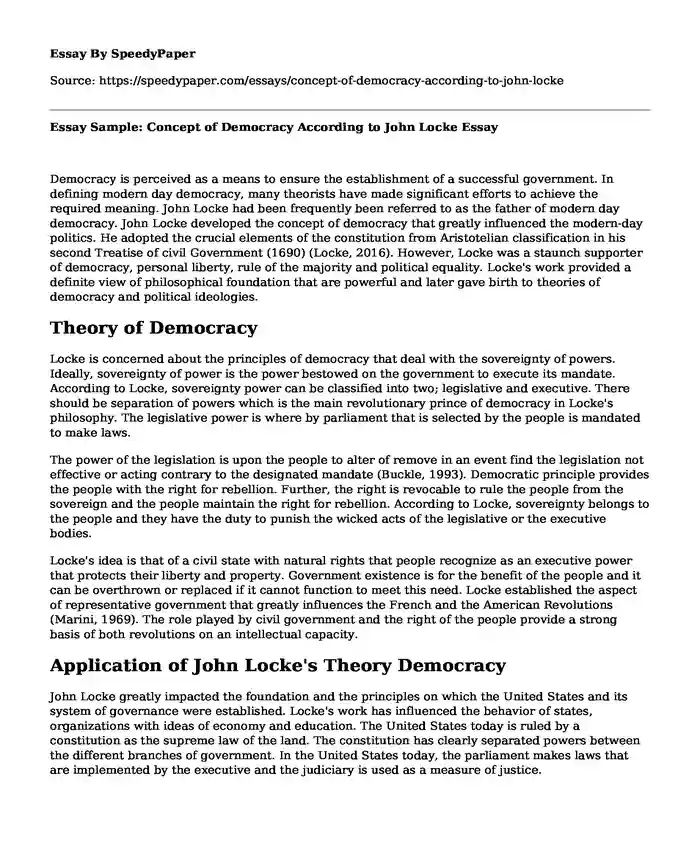Democracy is perceived as a means to ensure the establishment of a successful government. In defining modern day democracy, many theorists have made significant efforts to achieve the required meaning. John Locke had been frequently been referred to as the father of modern day democracy. John Locke developed the concept of democracy that greatly influenced the modern-day politics. He adopted the crucial elements of the constitution from Aristotelian classification in his second Treatise of civil Government (1690) (Locke, 2016). However, Locke was a staunch supporter of democracy, personal liberty, rule of the majority and political equality. Locke's work provided a definite view of philosophical foundation that are powerful and later gave birth to theories of democracy and political ideologies.
Theory of Democracy
Locke is concerned about the principles of democracy that deal with the sovereignty of powers. Ideally, sovereignty of power is the power bestowed on the government to execute its mandate. According to Locke, sovereignty power can be classified into two; legislative and executive. There should be separation of powers which is the main revolutionary prince of democracy in Locke's philosophy. The legislative power is where by parliament that is selected by the people is mandated to make laws.
The power of the legislation is upon the people to alter of remove in an event find the legislation not effective or acting contrary to the designated mandate (Buckle, 1993). Democratic principle provides the people with the right for rebellion. Further, the right is revocable to rule the people from the sovereign and the people maintain the right for rebellion. According to Locke, sovereignty belongs to the people and they have the duty to punish the wicked acts of the legislative or the executive bodies.
Locke's idea is that of a civil state with natural rights that people recognize as an executive power that protects their liberty and property. Government existence is for the benefit of the people and it can be overthrown or replaced if it cannot function to meet this need. Locke established the aspect of representative government that greatly influences the French and the American Revolutions (Marini, 1969). The role played by civil government and the right of the people provide a strong basis of both revolutions on an intellectual capacity.
Application of John Locke's Theory Democracy
John Locke greatly impacted the foundation and the principles on which the United States and its system of governance were established. Locke's work has influenced the behavior of states, organizations with ideas of economy and education. The United States today is ruled by a constitution as the supreme law of the land. The constitution has clearly separated powers between the different branches of government. In the United States today, the parliament makes laws that are implemented by the executive and the judiciary is used as a measure of justice.
The voting of the United States in 2008 proved to the world that democracy still existed. For the first in the history of America an African American president was elected. President Barack Obama was elected by a majority of Americans giving him the opportunity to serve as president. The election was considered as among best conducted elections. The Barrack Obama election as president ensured the sovereignty and non-interference of the USA election among other state affairs. The American election provided an insight to other countries to emulate (Larry P. Goodson, 2008). The worlds superpower had acted against the odds in delivering a credible fair election.
In summary, John Locke asserts the notion that governments should be democratic in providing services to citizens. The government should have checks and balances to ensure separation of powers for effective functioning of the government. The government should be able to coordinate the different branches of government to ensure they are independent and function as a unit. Locke emphasizes in the need for a civil society that will provide security to property individual liberty. In understanding democracy as a theory, Locke emphasizes on sovereignty as pillar of achieving balance. Sovereignty strengthens democracy and provides the independence of government institutions.
References
Buckle, S. (1993). John Locke. Natural Law and the Theory of Property, 125-190. doi:10.1093/acprof:oso/9780198240945.003.0003
Larry P. Goodson. (2008). The 2008 Elections. Journal of Democracy, 19(4), 5-15. doi:10.1353/jod.0.0029
Locke, J. (2016). 19. The Second Treatise of Government. Democracy. doi:10.7312/blau17412-025
Marini, F. (1969). John Locke and the Revision of Classical Democratic Theory. The Western Political Quarterly, 22(1), 5. doi:10.2307/446143
Cite this page
Essay Sample: Concept of Democracy According to John Locke. (2022, Mar 11). Retrieved from https://speedypaper.net/essays/concept-of-democracy-according-to-john-locke
Request Removal
If you are the original author of this essay and no longer wish to have it published on the SpeedyPaper website, please click below to request its removal:
- Free Essay on Theodore Roosevelt's Character Traits that Helped Him Become Successful
- Essay Sample about Early Childhood Curriculum. A Child's Connection to the World.
- The Mexican Ancestry, Essay Example for Students
- Is Technology Current Event 2? Essay Sample
- Free Paper: Observational Research Report on McDonald's Restaurants
- Free Essay Example. Confidentiality Is an Issue
- Essay Example: Mediation and Moderation
Popular categories





